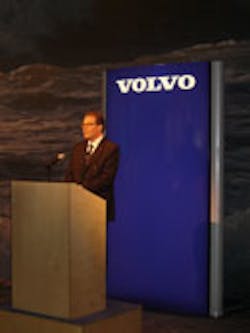Volvo rolls carbon-neutral
WASHINGTON DC. Sweden’s Volvo Group, parent of both Volvo Trucks North America and Mack Trucks Inc., here yesterday showed off a veritable fleet of seven trucks equipped with “carbon-neutral” engines capable of running on alternative fuels that will not make any net contribution of greenhouse gas carbon dioxide (CO2) to the atmosphere.
Volvo Group chose this week’s Washington International Renewable Energy Conference (WIREC), arranged by the U.S. State Dept., as an apt stage to reveal its carbon-neutral developments in the United States, following up on presentations it made at similar forums last year in Stockholm and Brussels.
The Volvo Group display of alternatively fueled trucks-- four Volvo FMs, two Volvo VNs and a Mack Pinnacle—at the WIREC trade show was mobbed during a news conference that was delayed by President George Bush’s tour of the booth. Once the conference was under way, Volvo Group CEO Leif Johansson outlined Volvo’s efforts to reduce the use of fossil fuels to power road transportation, declaring that “The climate issue is global and one for which the transportation industry has a special responsibility. By participating in WIREC, we gain the opportunity to show the American public that the Volvo Group is not just part of the problem, but also a part of the solution.”
Johansson pointed out that both the Swedish and U.S. governments are working to foster the development of technologies to reduce the use of fossil fuels in the transportation sector. He said that Volvo Group has participated in joint government programs aimed at reducing the use of fossil fuels, financed by the Swedish and U.S. governments as well as Volvo Group. For its part, Volvo is developing drivelines for heavy vehicles that are adapted to alternative fuels.
In Volvo’s case the solution is sevenfold plus one —seven carbon-neutral engines capable of running on specific alternative fuels as well as a diesel-electric hybrid that can reduce the amount of fossil fuel consumed compared to a straight diesel powerplant.
Johansson said that Volvo’s own analysis of carbon-neutral fuels was based on seven criteria: each fuel’s impact on the environment; each fuel’s inherent energy efficiency; the efficiency level in terms of the land used for cultivating crops needed to produce the respective fuels; the potential production volumes of the different fuels; the level of vehicle adaptation required to use the fuel; the costs of the fuel, and the ease of its distribution.
Volvo determined that seven alternative carbon-neutral fuels were worth pursuing: biodiesel, synthetic diesel, biogas, biogas plus biodiesel, dimethyl ether (DME), ethanol/methanol, and hydrogen gas plus biogas.
“Volvo has the technology and resources for carbon-dioxide-free transports [trucks] but we cannot do it alone,” said Johansson. “We also need large-scale production of renewable fuels and for this to occur requires substantial investments in research and development as well as clear and common guidelines from politicians and government authorities in as many countries as possible.”
There’s the rub. As Volvo sees it, no one can say the engines don’t exist to run on any of a wide range of possible fuels-- and now the government and corporate entities that can impact alternative fuel development and production must act to move that ball down the field.